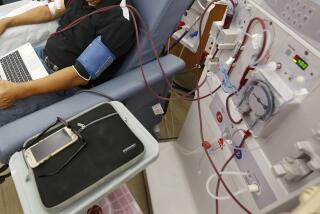Preventing rejection
- Share via
Organ transplants captured the public’s imagination when the first one was performed in the United States 50 years ago. Because of them, some people with potentially fatal kidney, liver, lung and heart disorders can now live for many years.
But though such operations may today seem routine to many Americans, doctors haven’t stopped working on making organ transplantation safer and easier. One of the biggest problems is that, for the rest of their lives, recipients must take powerful drugs to prevent their bodies from rejecting the new organs. These anti-rejection drugs can cause many serious, ultimately life-threatening side effects.
Future transplant patients may have easier recoveries. Researchers at UC San Francisco are testing a new type of anti-rejection drug that appears to be far less toxic to the body. It may even train the body to accept the new organ -- in this case, a kidney -- without the need for a lifetime regimen of drugs.
“Our goal is, at the very least, to simplify the treatment and, second, allow patients to accept a kidney in a better way and possibly become tolerant,” says Dr. Flavio Vincenti, a professor of medicine and surgery at UC San Francisco Medical Center.
Vincenti has found that the drug, called LEA29Y, appears to be as effective as cyclosporine in preventing kidney rejection six months after transplantation. And, reporting at a meeting of the American Transplant Congress, he said that 148 patients treated with LEA29Y had fewer side effects than 73 who took cyclosporine.
The new drug prevents rejection without affecting the entire body. Current drugs suppress the entire immune function so that it doesn’t recognize the new organ as foreign. “A sizable minority of patients with liver and heart transplants develop kidney disease,” says Vincenti. “The patients who receive a kidney transplant, their kidneys are threatened by these drugs.” A recent study in the New England Journal of Medicine found that, 10 years after transplant, almost all kidneys show signs of damage from the drugs, he says.
The traditional drugs can weaken immune systems so much that patients become vulnerable to infections and have a higher risk of cancer. The drugs are also linked to increased risk of cardiovascular disease and diabetes.
However, the traditional medications work quite well to prevent rejection, and any alternative drugs must prove to be as effective. “The rejection rate is less than 20% under the current regimen,” says Vincenti. “So drugs introduced in research have to compete with that.”
LEA29Y emerged from basic research on immune system function. More than two decades ago, scientists discovered that the immune system can become fully activated only if it receives two signals. One is a signal that helps the body recognize a foreign invader; the second, called a co-stimulation signal, allows the immune system to mount a response to invaders. Eventually, a drug was discovered that was able to block the co-stimulation signal in patients with organ transplants, preventing the activation of the immune response that would ultimately lead to rejection of the transplanted organ.
But, says Vincenti, “the rest of the immune system is not shut down.”
The new drug, which is similar to that earlier version, is given intravenously. Patients receive the medication frequently after the transplant.
The next phase of research is designed to determine whether some transplant patients can forgo drugs completely.
“LEA29Y holds out the possibility of tolerance,” says Dr. Jerry McCauley, director of transplantation nephrology at the University of Pittsburgh. “LEA29Y hasn’t been demonstrated clinically at a level most of us feel comfortable with. But it’s an early, leading candidate.”
In the next study, LEA29Y will be given to 30 kidney transplant recipients along with a traditional transplant drug called Rapamune. After one year, if patients do not have any immune activity against the kidney, the Rapamune will be stopped. At the end of the second year, if there is still no response, LEA29Y will be stopped.
“This has never been achieved,” says Vincenti, referring to tolerance of a transplanted organ. But he likes his chances. “There is no stronger science to induce tolerance than the science of co-stimulation blockage.”
*
(BEGIN TEXT OF INFOBOX)
Immune therapies
Many medications used to treat lupus, rheumatoid arthritis and asthma -- and to prevent rejection of transplanted organs -- can severely weaken the immune system.
Now federally funded researchers are developing a class of drugs to replace these immune-suppressing medications.
The work -- including the upcoming studies on LEA29Y -- is part of the Immune Tolerance Network at UC San Francisco.
The network consists of more than 80 researchers working to find therapies for disorders in which the immune system attacks itself and in which treatment often centers on suppressing the immune system.
The network’s projects include experimental therapies to replace the immunosuppressive drugs used in organ transplantation; certain autoimmune diseases, such as lupus and rheumatoid arthritis; asthma and allergies; and islet transplantation for diabetes.






